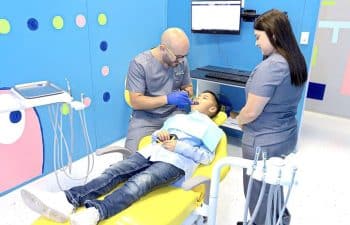
A child who has good oral health is more likely to perform well in school, whereas children with poor oral health may suffer negative effects on their grades, attendance, speaking, eating, and relationships. Centers for Disease Control and Prevention (CDC) research identifies these and other negative effects of poor oral health on children.
The most common dental issue suffered at an early age? Tooth decay. A pediatric dentist can treat and prevent tooth decay and other conditions to protect your child’s long-term health.
Untreated Tooth Decay Affects Early Development
One study published by BioMed Central (BMC) found that children who had unaddressed dental needs were between 4 to 8 times more likely to be developmentally at risk in one of five key areas:
- Physical health and well-being
- Social competence
- Emotional maturity
- Language and cognitive development
- Communication skills
- General knowledge
There are a number of possible reasons why this connection may exist, but we do know that children who suffer the effects of poor oral health are more likely to miss out on important markers and fall behind in school. Regular dental check-ups and proper dental hygiene can protect your child’s healthy development.
Children With Developmental Disabilities Are More Likely to Have Cavities
Strong brushing and flossing habits are an important aspect of any child’s oral health. Yet, it can be difficult to establish these routines in children with developmental disabilities. If they have limited dexterity, it may even be difficult for them to brush thoroughly.
The National Institute of Dental and Craniofacial Research lists cavities as the number one dental affliction in children with disabilities; however, they often suffer other oral health issues like:
- Periodontal disease (gum disease)
- Malocclusion (an imperfect bite)
- Teeth grinding, mouth breathing, tongue thrusting (affecting the alignment of the teeth and jaw)
- Delayed tooth eruption
- Dental trauma and injury (due to falls, seizures, or cerebral palsy)
How to Prevent Tooth Decay in Early Childhood
While some children are more likely to develop cavities, there are a few things you can do to prevent tooth decay and keep your child healthy:
- Using the proper amount of Fluoride toothpaste, brush your child’s teeth at least twice daily.
- Encourage your child to drink tap water, as it most likely contains fluoride that can help strengthen their teeth.
- Don’t allow your child to fall asleep with a juice bottle in their mouth.
- Limit high-sugar or added-sugar foods and drinks.
Special Needs Children May Require Unique Interventions
Children with disabilities may need extra support to keep their teeth healthy. While all of the above suggestions still apply, additional interventions may help:
- Offer help and support, including extra time to make sure their teeth are thoroughly brushed.
- If your child is resistant to brushing or is hesitant to start a routine, try changing up their toothbrush or toothpaste to make it exciting or appealing.
- If flossing is difficult, do the flossing for them or look into tools to make it easier like floss picks.
- Go the extra mile to find a dentist who can accommodate them and help them feel comfortable during check-ups.
Harlandale Kids Dental Offers Special Needs Children’s Dentistry
Whether your child needs early intervention, regular maintenance, or accommodations for their disability, the team at Harlandale Kids Dental can help. We offer a kid-friendly environment that aims to support children and families as they set up the foundation for good oral health. To set up an appointment, call 210-934-2098 or contact us online.
If you have a child with unique needs, we also offer special needs dentistry for kids in San Antonio. We can meet with your child to help them feel safer in our office, establish a relationship, and stay on top of their dental needs.
Posted on behalf of
238 SW Military, Ste 104
San Antonio, TX 78221
Phone: (210) 853-5600
Email: [email protected]
MON: CLOSED
TUES: 3:00PM - 8:00PM
WED: 9:00AM - 4:00PM
THURS: 3:00PM - 8:00PM
FRI: CLOSED
SAT: 9:00AM - 2:00PM
